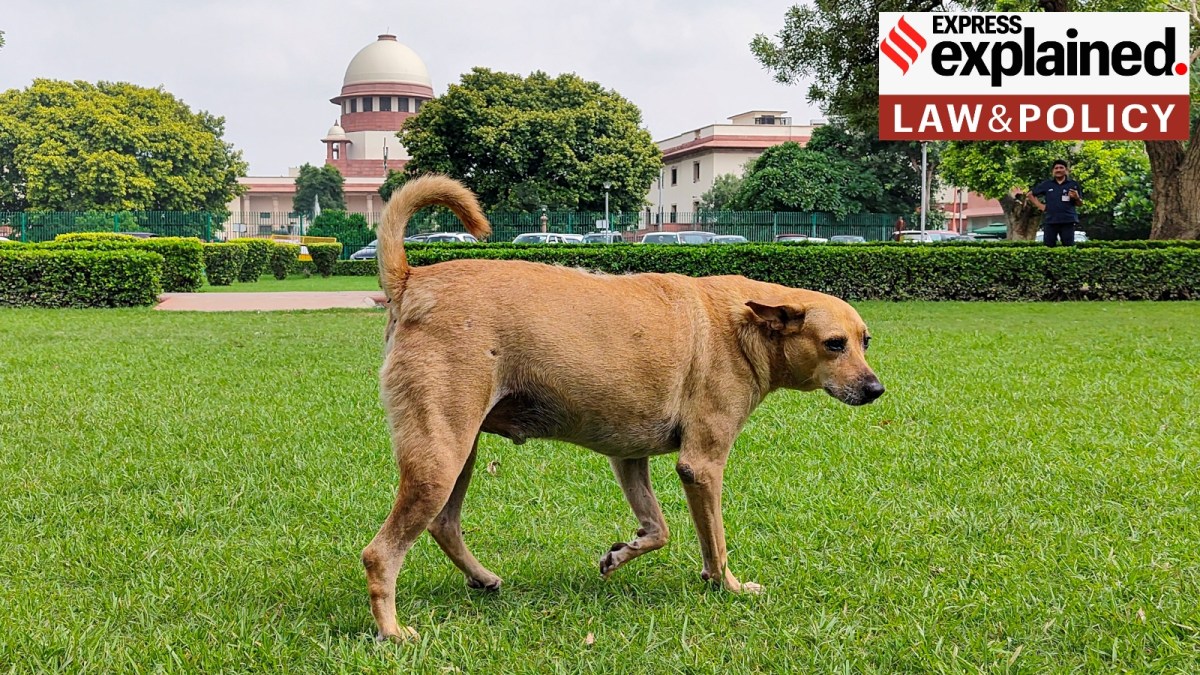A tale of two SC orders: What has changed, what hasn’t in the orders on stray dogs, issued 11 days apart
The Aug 11 order was stringent and demanded immediate compliance in the public interest. The Aug 22 order is more in line with established animal welfare laws, while also addressing public safety concerns.

A three-judge Bench of the Supreme Court on Friday (August 22) significantly modified the stringent order on stray dogs in Delhi and the National Capital Region (NCR) passed by a two-judge Bench last week.
On August 11, a Bench of Justices J B Pardiwala and R Mahadevan had directed that all stray dogs in the streets of Delhi-NCR should be permanently moved to shelter homes with no scope for release.
The order led to outrage and protests by animal rights advocates and dog lovers. In several urgent mentions before the Chief Justice of India, lawyers pointed out that the order conflicted with existing laws and judgments.
The matter was then placed before a larger three-judge Bench, which on Friday stayed the controversial ‘no-release’ mandate, and reinforced the existing policy of capturing dogs only for sterilisation, and then returning them to their localities.
The Bench of Justices Vikram Nath, Sandeep Mehta, and N V Anjaria also issued new pan-India guidelines for the feeding of stray animals, and expanded the scope of the case to formulate a national policy.
Friday’s order is more in line with established animal welfare laws, while also addressing public safety concerns.
Here’s a summary of what has changed in the Supreme Court’s first order in this matter.
August 11: The SC’s ‘no-release’ mandate
The two-judge Bench had taken up the matter on the court’s own accord on July 28 after reading a news report titled “City Hounded by Strays, Kids Pay Price”. On August 11, the Bench passed a slew of directions on the stray dog problem, directing the municipal authorities in Delhi, Noida, Ghaziabad, Gurgaon and Faridabad to “at the earliest start picking up stray dogs from all localities” and put them in designated shelters or pounds.
Significantly, the Bench ordered that “not a single dog picked up from any part of the locality shall be released back on the streets/public spaces”.
This was a clear departure from the prevailing Animal Birth Control Rules, 2023, (ABC Rules) that lay down a ‘capture-sterilise-vaccinate-return’ policy.
The Bench justified its order on grounds of the “larger public interest”. It said that infants, children, and the elderly should not fall prey to dog bites that could give them rabies.
“No sentiments should be involved in this entire exercise,” the order said, and warned that any individual or organisation obstructing the authorities would face “the strictest of actions”.
The court also directed the immediate creation of shelters, beginning with a capacity of 5,000 dogs in six to eight weeks, and ensuring humane conditions within them.
August 22: Shift to regulated management
In its interim order announced on Friday, the three-judge Bench signalled a major shift in the court’s approach towards the problem.
DOGS TO BE RETURNED TO THEIR AREAS: The Bench put the ‘no-release’ policy of the earlier order in abeyance, and clarified that the authorities must follow the established procedure: dogs that are picked up “shall be sterilised, dewormed, vaccinated, and released back to the same area from which they were picked up”.
DOGS WITH RABIES NOT TO RELEASED: However, the court ordered an important exception. It said that this policy would not apply to dogs that were “infected with rabies or suspected to be infected with rabies, and those that display[ed] aggressive behaviour”.
Such dogs are to be kept in separate shelters, and must not be released in the streets under any circumstances, the court said.
NO MORE STREET FEEDING: The court also prohibited the feeding of stray dogs in the streets and in public places. It directed municipal authorities to create dedicated feeding spaces for strays in each municipal ward. Individuals found feeding dogs outside of these designated areas would be liable for legal action.
This was to prevent “untoward incidents caused by unregulated feeding”, the court noted.
The ABC Rules already prescribe that resident welfare associations (RWAs) should designate feeding spots for dogs in consultation with their feeders.
APPLICABLE ALL-INDIA, NOT JUST NCR: The Bench expanded the scope of the case beyond Delhi-NCR, and made it a pan-India matter.
It impleaded all states and Union Territories, and directed that all similar cases pending in the various High Courts be transferred to itself in order to take stock of the steps taken by municipal authorities in compliance with the ABC Rules across India.
What remains of the August 11 order
The three-judge Bench did not strike down the August 11 order in its entirety.
* The direction for municipal authorities to create dog shelters and pounds remains in effect. This infrastructure will be used to house aggressive or rabid dogs that cannot be released in the streets.
* The court also reiterated its warning that “no individual or organisation shall cause any hindrance or obstruction” to authorities in implementing the court’s fresh directions.